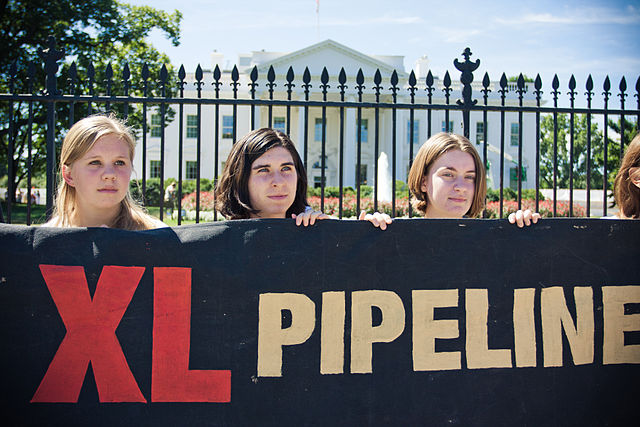Isn’t this article great? Why not chip in to help rabble.cachange the environmental conversation in Canada.
The time has come to do an impact assessment of the impact assessment of the Keystone pipeline.
An impact assessment is an assessment of the impact of being hit, ploughed under, in this case by a pipeline. Perhaps because everyone with an ounce of common sense intuitively grasps the potential for harm that is inherently involved in ramming through a megaproject, it is necessary to devise a process that will lend some legitimacy to what is to be done while minimizing the likelihood that it will kill the project.
The cause of this outburst of insight on my part is the release of the 11-volume environmental assessment report on Keystone by the US State Department and the response by our dour Minister of Unnatural Resources Joe Oliver.
It seems to me that the number of jobs that will be created in the U.S. in the building of this pipeline will be less than the number that have already been created in Canada by all the lobbying that has been done by the Government of Canada, the Government of Alberta and the Canadian Association of Petroleum Producers. We should quit while we’re ahead.
I don’t want to sound like those folk but the time taken is what creates the jobs, while having the further advantage that a project delayed can be a project stopped.
I speak from experience on this point. I was involved forty years ago in the impact assessment of a proposed gas pipeline in the Mackenzie Valley. A ten year delay was recommended by which time markets had changed such that the pipeline was not built — and still has not been built. Throwing sand in the machinery turns out to be well worth while. Do not abandon hope.
Back to those 11 volumes, which I do plan to read some time, and to Mr. Oliver. What effect will building Keystone have on what matters, namely, on carbon emissions and climate change? Incredibly, both the US State Department and Oliver essentially say: very little.
How is such nonsense possible? Easily, it turns out. First, assume that if Keystone is not built, bitumen will be exported anyway by some means, like rail. Are balloons or missiles or Amazon.ca drones possible? Dangerous, but we’re a brave — or is it a foolhardy? — people.
Second, assume that if the U.S. does not import dirty oil from Canada it will import it from somewhere else, like Venezuela. Addicts can’t be choosy.
Assume, that is, that alternatives are not really alternatives at all, that there is no alternative to what the oil industry intends to do in the pursuit of their profit and our catastrophe. Not surprisingly, this argument for Keystone is — I kid you not — the heart of the proponents’ case.
Inundated by worsening weather, we are expected to regard doing nothing about reducing carbon issues to be as good as it gets.
The same day that the State Department issued its report and Oliver, sensing that the pipeline had cleared another hurdle, licked his lips, the big news — which cannot be fudged — was the terrible drought in California, on track to be the worst in 500 years. Maybe Margaret Wente has already written, or is about to, that it is impossible to show with absolute certainty that there is any connection between that drought and the atmospheric change for which we humans are the root cause.
A goodly number of people, both in United States and Canada, are unavoidably experiencing extreme weather and increasing numbers do in fact recognize that we humans bear some responsibility for it. The truth will out and speaks to power which too often pretends to be deaf but is not blind.
We may still be uncertain how to make our political leaders do what needs to be done, but there always are alternatives. It is still possible that Mr. Obama will say No to Keystone, and if that really doesn’t matter, then how come Mr. Oliver is spending so much of his time and our money lobbying for a Yes? And if Obama says Yes, the game isn’t over till the ditch is dug, and the pipe laid, and the spigots turned, and the leaks begin.
The focus on pipelines makes sense because that is the mode for moving bitumen preferred by industry and the mode most vulnerable to being blocked by protest. But we must not lose sight of the big picture. The object of the exercise by opponents — as you may suspect, I count myself among them — is to stop the unearthing of bitumen and other fossil fuels the better to slow the escalation of catastrophes. Enough already, I say.
Image: wikimedia commons.




